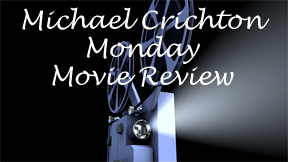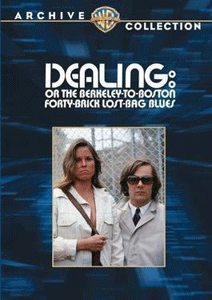“Comedy” is one of the categories IMDb lists for “Dealing, or The Berkeley-to-Boston Forty-Brick Lost-Bag Blues” (1972). But this is the driest kind of comedy imaginable. Essentially, director/co-writer Paul Williams – adapting the novel from two years earlier by brothers Michael and Douglas Crichton – takes a snapshot of the early Drug War and free-love era.
Snapshot of an era
In a scene that sums up the style, Peter (a.k.a. “Lucifer”) and Susan (changed from the book’s Sukie) lie post-coitally naked on the floor of a recording studio. A musician walks in, drops off some books, and they all exchange pleasantries in a perfectly normal fashion.
“Dealing” is a snapshot of 1972 that has aged well because it’s now a wonderful time capsule. (The crisp transfer to DVD in 2009 for the WB’s Archive Collection helps.) Upon its release, viewers perhaps felt “Dealing” didn’t have enough of an original statement. I felt that way about the book, but I think the movie – co-written by David Odell (“Nate and Hayes,” “Supergirl”) — speaks more strongly about the time.

“Dealing, or The Berkeley-to-Boston Forty-Brick Lost-Bag Blues” (1972)
Director: Paul Williams
Writers: David Odell, Paul Williams; based on the novel by Michael and Douglas Crichton (writing as Michael Douglas)
Stars: Robert F. Lyons, John Lithgow, Barbara Hershey
Williams and Odell especially make a statement in an appropriately cinematic finale where no less than four sides – all acting out of self-interest — meet in a final showdown in an otherwise uninhabited and snowy Boston-area park.
Although the glowing but underused Barbara Hershey (as Susan) is top-billed, Robert F. Lyons plays the main character. Lyons has a touch of Dustin Hoffman and a smidgen of “Garden State’s” Peter Sarsgaard as Lucifer transports bricks of marijuana across the country for his older brother, John (John Lithgow). Especially with their hairstyles, Lyons and Lithgow look very much like brothers.
In some ways, it hasn’t aged a day
Lyons evokes “Dealing’s” dry tone while also showing Lucifer’s increasing apprehension. Initially, Lucifer is in it out of boredom with his Harvard law schoolwork. Later, he’s in it to rescue Susan, who has been picked up by the Boston police, led by corrupt Murphy (Charles Durning). He’s never in it particularly to make money or to stick it to the man.
All the actors are good, but Lyons in particular gives the movie more emotion than the book, which is slightly satirical – but only because of the rhythms of the Crichton brothers’ prose, not because of any out-of-the-box insights.
“Dealing” is, as I noted, a time capsule. But it’s also hyper-relevant. Every single element of the plot is made possible because marijuana is illegal – and a half-century later it’s still illegal in many places. Russia is among those places, as we know from the current Brittney Griner case. But the USA is also among those places.

As the federal government works to free Griner from Russia (as it should), let’s not let it off the hook for its hypocrisy: It will still nail its own citizens for dealing (or even possessing). There’s nothing funny about arresting and imprisoning people for a non-violent, artificially invented crime. And as “Dealing” dryly yet crisply shows, the Drug War never was comedic.

